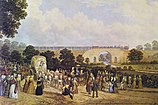
Back Anyos 1820 AN عقد 1820 Arabic عوام 1820 ARY عقد 1820 ARZ Década del 1820 AST 1820-ci illər Azerbaijani 1820-an BAN 1820-я Byelorussian 1820-я BE-X-OLD 1820-те Bulgarian
This article needs additional citations for verification. (December 2009) |
| Millennium |
|---|
| 2nd millennium |
| Centuries |
| Decades |
| Years |
| Categories |
The 1820s was a decade of the Gregorian calendar that began on January 1, 1820, and ended on December 31, 1829.
It saw the rise of the First Industrial Revolution. Photography, rail transport, and the textile industry were among those that largely developed and grew prominent over the decade, as technology advanced significantly. European colonialism began gaining ground in Africa and Asia, and trade with the Qing Dynasty began to open up more towards foreign traders, particularly those from Europe. As European imperialism gained momentum, opposition from affected/exploited societies resulted, with wars such as the Java War and the Greek War of Independence. Resistance in the form of separatism and nationalism (particularly in the Spanish American wars of independence) led to the independence of many countries around the world, such as Brazil, Peru, and Bolivia.







